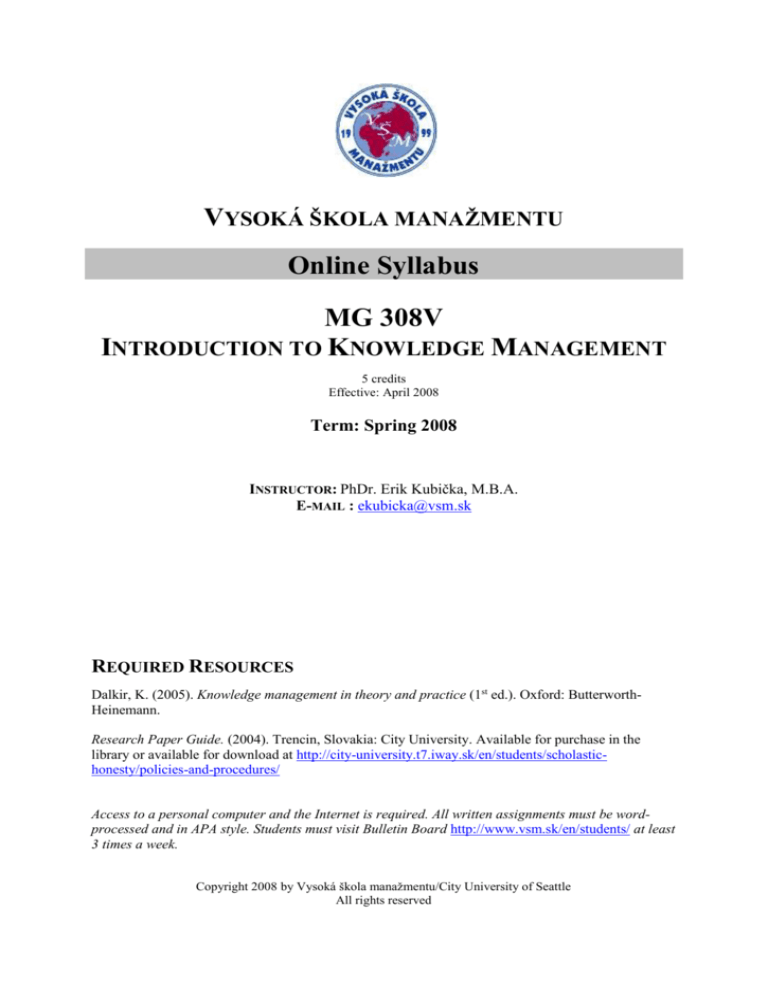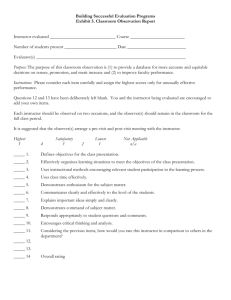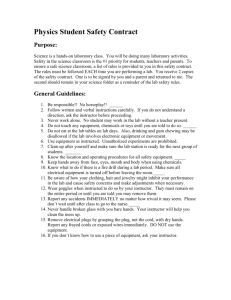
VYSOKÁ ŠKOLA MANAŽMENTU
Online Syllabus
MG 308V
INTRODUCTION TO KNOWLEDGE MANAGEMENT
5 credits
Effective: April 2008
Term: Spring 2008
INSTRUCTOR: PhDr. Erik Kubička, M.B.A.
E-MAIL : ekubicka@vsm.sk
REQUIRED RESOURCES
Dalkir, K. (2005). Knowledge management in theory and practice (1st ed.). Oxford: ButterworthHeinemann.
Research Paper Guide. (2004). Trencin, Slovakia: City University. Available for purchase in the
library or available for download at http://city-university.t7.iway.sk/en/students/scholastichonesty/policies-and-procedures/
Access to a personal computer and the Internet is required. All written assignments must be wordprocessed and in APA style. Students must visit Bulletin Board http://www.vsm.sk/en/students/ at least
3 times a week.
Copyright 2008 by Vysoká škola manažmentu/City University of Seattle
All rights reserved
MG 308V
INTRODUCTION TO KNOWLEDGE MANAGEMENT
This document provides an overview of the course foundation elements and assignments. For
information about general Vysoká škola manažmentu policies, please see the Vysoká škola
manažmentu catalog. If you have additional questions about the course, please contact your instructor.
SCHOLASTIC HONESTY POLICY
City University of Seattle expects each student to do his/her own work. The University has "zero
tolerance" for cheating, plagiarism, unauthorized collaboration on assignments and papers, using
"notes" during exams, submitting someone else's work as one's own, submitting work previously
submitted for another course, or facilitating acts of academic dishonesty by others. The penalties are
severe! A first offense can result in a zero grade for the course and suspension for one quarter; a
second offense can result in a zero grade for the course and suspension for two or more quarters; a
third offense can result in expulsion from the University. The Policy and Procedures may be found at
http://city-university.t7.iway.sk/en/students/scholastic-honesty/policies-and-procedures/ or
www.cutn.sk/SH.
In addition to providing your work to the instructor for grading, you must also submit an electronic
copy for the City University of Seattle archives (unless the work is specifically exempted by the
instructor). You will not receive a grade for particular work until and unless you submit this electronic
copy. The procedure for submitting work to the archives is to upload it via the website
http://bb.cutn.sk/cgi-bin/new_upload.pl or www.cutn.sk/Upload. Files should include the cover page
of the work with the student name, instructor name, course name and number, and date. File names
should indicate the type of assignment, such as “researchpaper.doc”, “casestudy.doc” or “thesis.doc”
(student name should not be a part of the file name because the system adds it). All files received into
the archives are submitted to www.TurnItIn.com for plagiarism checking.
COURSE DESCRIPTION
Knowledge management is a relatively new concept and its multidisciplinary character involves many
areas of human activities not only in business sphere. The main purpose of this course is to provide an
introduction to characteristics of knowledge society and economy, systemic environment of
knowledge management on organizational level, theoretical bases of knowledge management,
practical examples and methods of its implementation, and to outline and explain basic principles,
processes, methods, and techniques applicable for realization of its activities.
LEARNING GOALS
Upon the successful completion of this course, you will be able to:
1. Explain basic concepts related to knowledge economy and knowledge management;
2. Identify and better understand systemic environment of knowledge management;
3. Characterize situation of knowledge economy on national and international levels;
4. Explain differences between data, information, and knowledge and outline their role in modern
managerial trends;
5. Describe the nature of knowledge management and understand its various perspectives;
6. List and describe information, communication, and knowledge technologies applicable in
realization of knowledge management activities;
7. Identify the key organizational, process, and managerial aspects of knowledge management.
MG 308V Online SYL Page 2
Eff: 4/2008
CORE CONCEPTS
To achieve the goals of this course, you will need to master the following core concepts:
1. Data, information, and knowledge (explicit, implicit, and tacit);
2. Information and knowledge society;
3. Knowledge economy;
4. Knowledge management, definitions and perspectives;
5. Learning organization;
6. Technologies applicable in knowledge management;
7. Information and knowledge system;
8. Cybernetics and artificial intelligence;
9. Knowledge systems development methodologies;
10. Activities of knowledge management;
11. Implementation methodologies of knowledge management.
RECOMMENDED SUPPLEMENTARY RESOURCES
As a City University of Seattle student, you have access to library resources regardless of where and
how you are taking this class. To access the resources necessary to complete your coursework and
assignments, visit the library home page at http://www.cutn.sk/
Search the local library's online catalog to locate books. For additional help, visit the library or submit
your question at Contact Us in the Slovakia library web site.
ELECTRONIC RESOURCES
The following Internet resources may be of use to you in this course. Please be aware that Web
addresses may change from time to time. Consult with your instructor if you have questions about
electronic resources.
Vysoká škola manažmentu: http://www.vsm.sk
The Ark Group : www.ark-group.com/home/km/
Destination KM : www.destinationKM.com
KM Institute : www.kminstitute.org
KMPro : http://kmpro.org
Knowledge Management Consortium International : www.kmci.org
Knowledgeboard : www.knowledgeboard.com
MG 308V Online SYL Page 3
Eff: 4/2008
OVERVIEW OF COURSE ACTIVITIES AND GRADING
The grade you receive for the course will be derived using Vysoká škola manažmentu’s decimal
grading system, based on the following:
Assignment
Student Introductory Assignment (SIA)
Discussion Assignments
Research Paper
Project
Final Exam
TOTAL
Percentage of the overall grade
0%
20%
25%
25%
30%
100%
Please see the current Vysoká škola manažmentu catalog or consult your instructor for guidance in
determining your decimal grade.
EXPLANATION OF ASSIGNMENTS AND GRADING
STUDENT INTRODUCTORY ASSIGNMENT
City University requires that you submit a Student Introductory Assignment (SIA). This SIA must be
completed during the first week of your course. The SIA consists of introducing yourself in the
Discussion Forum titled: Student Introductory Assignment. It is designed to begin the online class
experience by letting us know you are in class and facilitating interaction. It is due at the end of the
first week. Even though this assignment is not graded, it is required in order for you to continue your
course. Your instructor will notify CU/VSM at the end of the first week as to whether or not you
completed your SIA.
ONLINE DISCUSSION
A discussion topic from your instructor appears in the discussion forum in the current week. You are
to post at least twice - your answer as well as a reaction to your colleagues’ post to the discussion
forum by the end of each session. The forum is to help promote student-to-student discussion. The
instructor will not be responding to each posting. If you have a question or comment that is
specifically for your instructor, email your instructor directly. Although the tone of your discussion
board postings can be informal, your instructor will expect them to be on a professional level. In other
words, your comments and questions for discussion should be clear and thoughtful, with correct
grammar, spelling, and punctuation. As with written assignments, the quality of your discussion
postings will be graded on both content and presentation. University scholastic honesty principles and
policies apply.
Grading Criteria for Online Participation
Quality of response
Quantity of appropriate responses (3 per topic)
TOTAL
50%
50%
100%
RESEARCH PAPER
You will work in teams on this assignment. Your team research paper topics can include:
Knowledge and society
Knowledge management (general information, history, development etc.)
Knowledge management and organization
Technologies and knowledge
MG 308V Online SYL Page 4
Eff: 4/2008
Knowledge systems (general information, types, design, development etc.)
Knowledge management implementation (process of implementation, methodologies etc.)
You will research the chosen topic through the review of literature and you may also be asked by the
instructor to undertake some field research (e. g. among the users of knowledge systems etc.). The
paper must contain at least 5 sources, 3 of which must by university sources. If any field work is
included (e. g. employee survey), its documentation as well as its results must be presented. University
scholastic honesty principles and policies apply (see above and also the Research Paper Guide).
Grading Criteria for Research Paper
Clear and understandable presentation of information
Logical organization of research and conclusions
Depth of the research (appropriateness of sources, their quality and use)
Inclusion of course concepts
Grammar, spelling, punctuation, and syntax
TOTAL
30 %
20 %
20 %
20 %
10 %
100 %
PROJECT
While the research paper was focused on theory, this assignment is supposed to be a practical
application of the course concepts. You will work in the same teams as in case of the research paper.
Your task will be to prepare a project from the field of knowledge management. Examples of such
project may be design or software of an information or knowledge system, proposal of a knowledge
system or knowledge management implementation in an organization, a guide for managers in the
field of knowledge management etc.).
Grading Criteria for Project
Professional presentation of materials including grammar, spelling, punctuation,
syntax, and format of citations
Practical value of information
Arrangement of the text and graphics
Logical organization of the content
TOTAL
30 %
25 %
25 %
20 %
100 %
FINAL EXAM
You should be prepared to answer essay questions pertinent to the concepts covered in or suggested by
the course materials, assignments and activities. The review questions will be provided by the
instructor a week before the final test to help you to prepare.
Grading Criteria for the Essay Questions in the Final Test
Demonstration of understanding of the concept
Appropriateness, depth, and support of arguments
Demonstration of analytical, synthetic, and conceptual skills
Organization and logical flow of answers
TOTAL
MG 308V Online SYL Page 5
25%
25%
25%
25%
100 %
Eff: 4/2008
PROCTORED EXAMINATIONS
Final exams will take place both in Trenčín and Bratislava sites. In case of time conflict, you may use
the CU/VŠM Proctor Center. However, you must inform your instructor about your interest in taking
exams at the Proctor Center before Friday of Week 3. Students who do not inform their instructor on
time cannot use the Proctor Center and must travel to their instructor’s site.
If you cannot take the exam in either Bratislava or Trenčín, you must find a proctor (e.g. local library
head, local university instructor), fill out the Proposed Proctor Approval Request Form
(http://www.vsm.sk/files/studenti/Proctor-Form-vsm.pdf), and submit the form to your Associate Dean
for approval (Denisa Hackett, dhackett@vsm.sk or Alena Busikova abusikova@vsm.sk) before
Friday, Week 3. Also notify your instructor that you have submitted a proctor form. Proctor forms
submitted after the deadline will not be accepted and you will be required to take the exam with your
instructor.
INFORMATION ABOUT INSTRUCTOR
After finishing the Economic High School (today Business Academy) in Trenčín, he started working
in the field of marketing at the Exhibition Area TMM, from 1993 as a head of business unit. In 1994,
he works in Codea Agency, Ltd. in Bratislava and manages the trade fair Móda Bratislava. He also
starts his studies at City University and his own business activities. After finishing his bachelor
studies, he stays working with City University/Vysoká škola manažmentu in the position of the
instructional materials coordinator. He is the co-author of the City University Textbook Information
System. In 1999, he is taking over the position of the community program coordinator. He cooperated
on the development of the curriculum for this program. After finishing his M.B.A studies in 2001, he
becomes the associate dean managing the academic operations at the campus in Bratislava (800
students, 60 employees, 5 academic and preparatory programs) in 2003. He was a member of the
internal accreditation team that successfully completed the Slovak accreditation of the university’s
bachelor and master programs. He cooperated on the project of the academic department restructuring
(katedra system). In 2005, he obtained the doctorate of philosophy degree in management of
information systems at the Faculty of Management of the Comenius University in Bratislava. He
teaches courses in management, organizational behavior and information systems. He teaches
management also at the Faculty of Machinery of the Slovak Technical University in Bratislava. From
2006, he manages own business consulting firm.
MG 308V Online SYL Page 6
Eff: 4/2008
RECOMMENDED COURSE SCHEDULE
The schedule for course activities and assignments is below. If you find you are unable to complete the
assignments as scheduled, contact your instructor. Your instructor may elect to adjust the outline to
meet the unique needs of the class.
WEEK TOPICS AND ASSIGNMENTS
LITERATURE
Dalkir,
Chapter 1
1
Knowledge Management (Definition, History, and Presence)
Student Introductory Assignment: What Do You Expect from This
Course?
2
Knowledge Management for Individuals, Communities, and Organizations
Online Discussion: Information versus Knowledge Society
Dalkir,
Chapter 1
3
Knowledge Management Cycle
Due: Proctor Information
Dalkir,
Chapter 2
4
Knowledge Management Models
Online Discussion: Knowledge Management
Dalkir,
Chapter 3
5
Knowledge Capture and Codification
Due: Topics for Research and Project
Dalkir,
Chapter 4
6
Knowledge Sharing and Communities of Practice
Knowledge Application
Online Discussion: Knowledge Management Implementation
Dalkir,
Chapters 5 and 6
7
The Role of Organizational Culture
Due: Research Paper (May 18, 2008)
Dalkir,
Chapter 7
8
Knowledge Management Tools
Knowledge Management Strategy and Metrics
Online Discussion: Learning Organization
Dalkir,
Chapters 8 and 9
9
The Knowledge Management Team
Future Challenges for Knowledge Management
Due: Questions for Final Exam Preparation
Dalkir,
Chapters, 10 and
11
10
Date: Final Exam (to be specified during the course)
Due: Project (June 8, 2008)
MG 308V Online SYL Page 7
Eff: 4/2008








